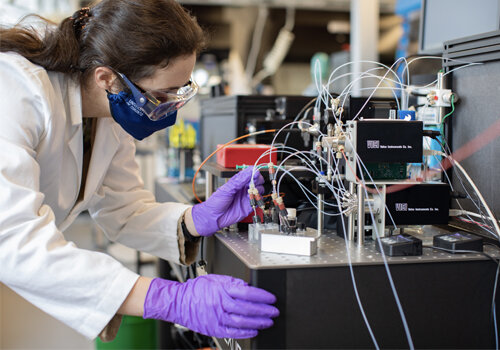
The University of Toronto announces the launch of the Acceleration Consortium (AC), a new global coalition of academia, industry, and government, that will use artificial intelligence (AI) and robotics to accelerate the design and discovery of materials that don’t yet exist. These advanced materials will make technologies more affordable and eco-friendly with applications ranging from renewable energy and consumer electronics to drugs.
A New Paradigm in Materials Discovery
By leveraging the power of AI, robotics, engineering and chemistry, the AC will make U of T a global centre for materials science innovation. Using materials acceleration platforms (MAPs), also known as self-driving laboratories, the AC will rapidly design and discover the materials needed to build a more sustainable, prosperous and healthy future. The AC is led by Alán Aspuru-Guzik with support from the Faculty of Arts & Science in partnership with the Faculty of Applied Science & Engineering and the Division of the Vice-President, Research and Innovation.
“AI is changing the way we do science,” said Alán Aspuru-Guzik, Director of the Acceleration Consortium, Canada 150 Research Chair in Theoretical Chemistry in the Departments of Chemistry and Computer Science at U of T and Canada CIFAR AI Chair at the Vector Institute. “The Acceleration Consortium’s self-driving laboratories will revolutionize advanced materials innovation by reducing the time and cost to develop new materials from an average of 20 years and $100 million to as little as 1 year and $1 million.”
The AC’s launch coincides with a recent announcement by the Government of Canada to provide $58.9 million in investments to the National Research Council of Canada and Natural Resources Canada to support new laboratory space for advanced materials and the collaborative deployment of MAPs in Mississauga and Hamilton.
“We take pride in a legacy of innovation and discovery that has changed the way we think about the world and respond to society’s most pressing social, economic and environmental questions,” said Melanie Woodin, dean of the Faculty of Arts & Science at U of T. “I am excited to participate in this enterprise that will advance us in new areas of scientific inquiry.”

